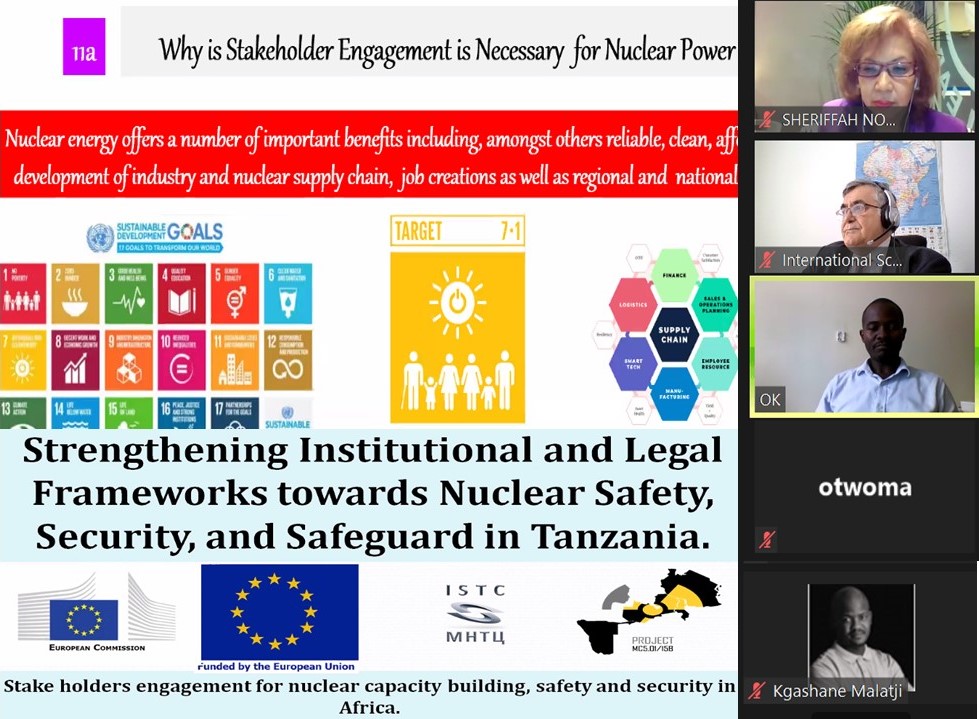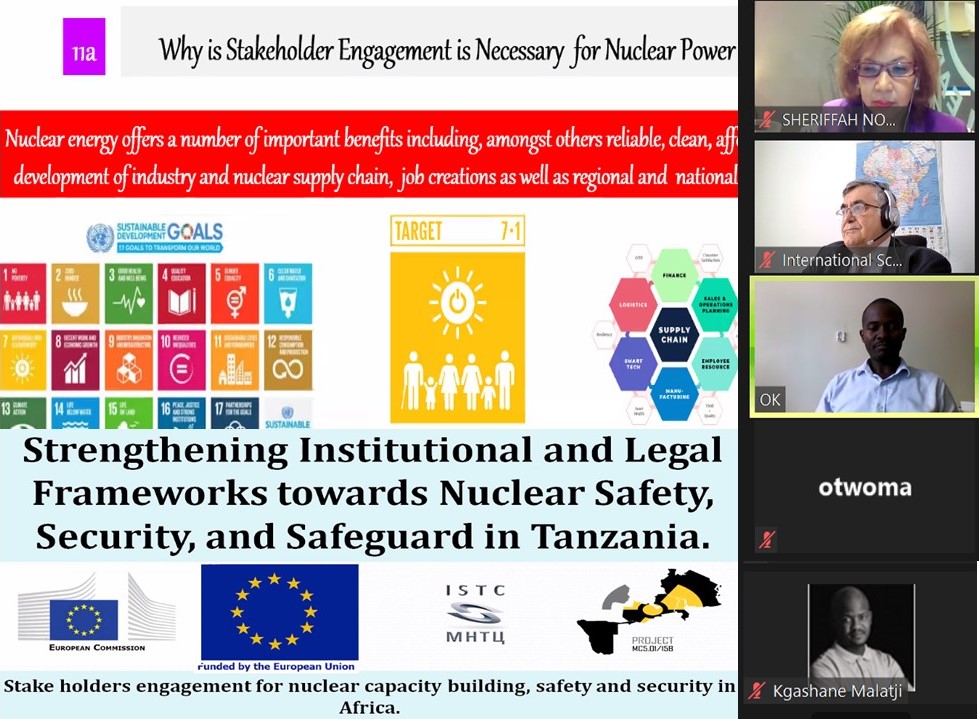Stakeholders Engagement - a Building Block to Better Nuclear Safety and Security Culture

Nur-Sultan, 5 March 2021. With an on-line working meeting on 24th February 2021, a group of participants and partners of Project MC5.01/15B from ten countries, kicked off a series of webinars that will spotlight Stakeholders Engagement, one of the IAEA milestones in the development of nuclear infrastructure and the spread of nuclear safety and security culture. The webinars will allow several Southern African countries, including Tanzania, Namibia, and Zambia to share and learn from their experiences by presenting their country specific reports. As one of the main deliverables from Project MC5.01/15B, the reports survey the national legal and regulatory frameworks for nuclear safety and safeguards, the institutional infrastructure and stakeholders, the decision-making processes and policies, and the degree of compliance with international standards.
 Ms. Sheriffah Noor Khamseah Al-Idid bt Dato Syed Ahmad Idid, Innovation and Nuclear Advocate, Alumna, Imperial College, University of London made a presentation, entitled Fundamentals of Stakeholders Engagement. She outlined the role of African countries as producers and exporters of Uranium, and shared international data about the nuclear ambitions of a dozen African states. The effective communication with stakeholders is often identified as one of the biggest challenges when initiating a nuclear power programme or undertaking related activities, such as Uranium mining. Providing accurate information and fostering trust are key elements in the relationship with various social, institutional, and business partners and the concerned communities. The speaker emphasized the importance of stakeholders mapping and assessment, the elaboration of stakeholders’ engagement strategy and involvement plan, the use of appropriate communication channels and tools, the regular dialogue with media, NGOs, academia and grassroot organizations.
Ms. Sheriffah Noor Khamseah Al-Idid bt Dato Syed Ahmad Idid, Innovation and Nuclear Advocate, Alumna, Imperial College, University of London made a presentation, entitled Fundamentals of Stakeholders Engagement. She outlined the role of African countries as producers and exporters of Uranium, and shared international data about the nuclear ambitions of a dozen African states. The effective communication with stakeholders is often identified as one of the biggest challenges when initiating a nuclear power programme or undertaking related activities, such as Uranium mining. Providing accurate information and fostering trust are key elements in the relationship with various social, institutional, and business partners and the concerned communities. The speaker emphasized the importance of stakeholders mapping and assessment, the elaboration of stakeholders’ engagement strategy and involvement plan, the use of appropriate communication channels and tools, the regular dialogue with media, NGOs, academia and grassroot organizations.
Eng. Abdalah Abdulrahman Kileo, Radiation Health Physics Research Officer, Head Eastern Zone TAEC Office, presented – as co-author – the report entitled Strengthening Institutional and Legal Frameworks towards Nuclear Safety, Security, and Safeguard in Tanzania. The elaboration of the report included focus group discussions and interviews with key informants, as well as stakeholders’ workshop with the participation of ten ministries and government agencies plus the University of Dar es Salaam and the Institute on Mineral Resources. Mining activities in Tanzania revealed seven major Uranium deposit blocks. Only one, out of the 70 local and international registered prospecting companies received a license, that was later revoked. Chronologically, the regulatory infrastructure preceded mining, as it was created in mid 1980s in relation to nuclear applications, mostly in medicine. Established at the beginning of 2000s, the Tanzania Atomic Energy Commission (TAEC) was vested with all the powers for regulation and control of safe and peaceful use of nuclear technology and was tasked with promotion of nuclear applications. Legislation, currently in preparation, will separate the regulatory part of TAEC form the promotion part. In Tanzania, as elsewhere in Africa, there exist great challenges to the safety and security of transportation of radioactive minerals. A specific circumstance is that Tanzania’s three seaports - Dar es Salaam, Tanga and Mtwara - serve seven non-coastal African countries. Also, Tanzania serves six neighbouring landlocked countries through its road networks and railways. While Tanzania is still preparing to begin exploitation of its Uranium resources, the report recommends to improve the existing regulatory infrastructures and policy coordination and to address the shortage of human resources and the scarcity of radioactive protection and monitoring equipment, among other challenges.
Dr. Timur Zhantikin, Director, Kazakhstan Nuclear Power Plants, made useful observations on the report and shared the experience of the Committee for Atomic Energy Supervision and Control, which he headed until recently. He emphasized the importance of the regulator’s independence and the need to interact with other agencies with parallel competences, e.g., the Transport Committee, in the governance procedures pertaining to transportation of radioactive materials.
Based on the experience of Kenya and other African countries, Dr. David Otwoma, Chief Analyst and Deputy Director, Kenyan National Commission for Science, Technology and Innovation, observed that in Kenya the split and differentiation between regulators and promoters took place only a couple of years ago and Tanzania is not an exception but just another illustration of that process.
Dr Joseph Lucien Zafimanjato, Director, Radiological Safety and Nuclear Security, Madagascar, shared the experience of his agency in organizing the Nuclear Days public event that may be especially useful for Tanzania that is preparing the 1st Annual Conference and Exhibitions on Nuclear Science and Technology Applications-2020 (ACENSTA2020), currently postponed due to the COVID pandemic.
Participants were reminded that the next edition of the ISTC series of webinars will be conducted in March 2021.

